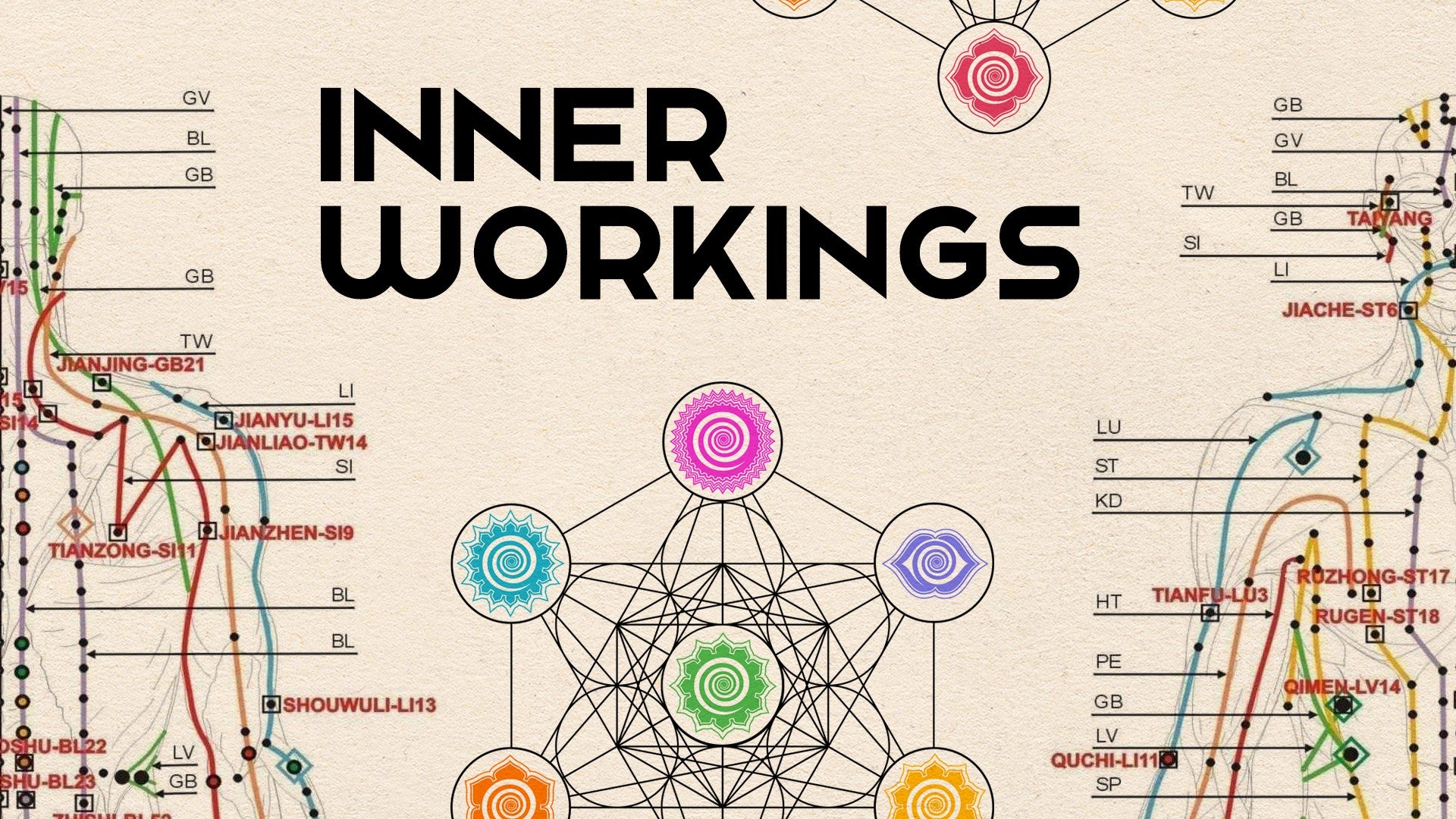Description
About This Video
Transcript
Read Full Transcript
(ocean surf) So we'll complete our first season of Inner Workings with a discussion of Sutra 1.33. Now sutra is a word that usually gets translated as "thread," and this particular sutra sits in a text known as Patanjali's Yoga Sutras. Now this is an incredibly mysterious text that through the course of history has gone in and out of popularity within India. And yet most people almost agree that it showed up around 2,000 years ago, and that we can think of Patanjali more as an editor than even perhaps an author, an editor of an oral tradition that had already been in existence. And the one in this case, refers to chapter one, and the three, three, number 33.
Now Patanjali's definition of yoga, which is Sutra 1.2, is understood as "Yogas chitta vritti nirodha." Again, please excuse my Sanskrit. Now "Yogas chitta vritti nirodha" is generally most often translated as something like: "Yoga is the stilling of the fluctuations of the mind." With chitta or chitt in this case referring to the mind, vritti referring to the fluctuations, and nirodha referring to the act of stilling. Let's just pause for a moment on this word, chitta. So when this word came through the translation into the West, it usually got translated as mind. And yet within the East, rarely is there a separation between mind and heart.
So we can even understand this definition as "Yoga is the stilling of the heart-mind." Now in Patanjali's Yoga Sutras, the way this first chapter works is the very first suggestion on how we might find some ease, and if you need to translate this a little differently, how we might calm the (speaking in a foreign language) that we all suffer from all the time. The very first suggestion in the Sutras is the suggestion of what is referred to in Sanskrit as ishvara pranidhana which is, we can understand this as the suggestion of "Sweetheart, darling, will you please "trust a little more, have a little bit more faith, "see that all is working?" The second suggestion after that in this text is simply, "Well, why don't you try ohm-ing "while knowing what it really means?" Which then brings us to Sutra 1.33. And 1.33 is a part of a little section in the Sutras, 1.33 to 1.39 which shows up essentially as these very practical suggestions on how one might find some ease within the mind and the heart. Okay. So the very first suggestion here on how one might find some inner peace, inner calm, some relief, essentially, from the tyranny of one's own mind, is, "Sweetheart, darling, why don't you try practicing some friendliness, maitri, karuna, compassion, mudita, sympathetic joy, or upekshanam, neutrality or equanimity.
Another sutra gets translated slightly differently through different translations. Sometimes you'll see, "Please practice friendliness "to those who seem to be happy, "compassion to those who seem to be suffering, "sympathetic joy to those who appear to be virtuous, and equanimity to those who appear to be wicked." And sometimes you'll see the sutra translated as: "Try practicing friendliness, "compassion, sympathetic joy, or goodwill, "whether or not the object you encounter "seems to be friendly or happy, suffering, "virtuous, or wicked." The play here, and the reason I want to bring this up in the last meeting of our first season of this show is that relationship is not a modern problem. Relationship has been around as long as we've been around. And so the suggestion, right, that one might find peace in one's own mind through the practice of friendliness, compassion, sympathetic joy, and upekshanam, equanimity, okay, is the suggestion that this is where most of our apparent troubles come from. Now this must just have been as hard as it was 2,000 years ago as it is today, because the very next suggestion is: "Darling, sweetheart, why don't you try "taking a deep breath?" (chuckles) And right after that, "Why don't you try focusing "on something subtler," etc.
But the play of this, if we understand these as just words and our Tibetan friends refer to these as the four measurables, if we only know friendliness as an idea, if we only know compassion as something we should do, if we only know goodwill or spaciousness as something that one day might happen spontaneously, then we have no chance of finding them. These are very real states of being that already are. Friendliness already is, compassion already is, goodwill already is, spaciousness already is. It's up to us to stop blocking it. And so the play as our last practice today within this series is can we actually start to find out what these things feel like?
Like, do we even know what friendliness feels like? Okay. So, the play here now is find yourself in a comfortable seat. So I'm sitting up on blankets, you might be in a chair, you might be on your couch, but you want to make sure that you're comfortable and your spine is alert. This is one of the only definitions that Patanjali gives us in the sutras about posture, this is Sutra 2.46.
Sthira sukham asanam, which sometimes gets translated as: "The posture is both alert and relaxed." And asana in this case is often translated as "seat." So make sure you're quite comfortable, so sometimes the way we put that is "saddle up." Big deliberate inhale, exhale everything, so soft in the belly, like we've been playing with, soft here. Okay. Generous in your heart, and like open in the mind, okay. And just here, and I know this isn't so easy, but just here, right now, can you just tune into friendliness. Like let your eyes close and just like tune into friendliness.
And like just see if you have a physiological relationship with friendliness. "Maitri" is the Sanskrit, you might even say that, "maitri." Friendliness. And if it's not coming, then take the advice of the sutra. Practice friendliness to those who appear to be happy. "Sukha," so in your mind, do you have somebody that brings you joy?
Or a pet or a being? And then you just be with. Notice how it feels in your heart and your face, in your breath, last few moments, in your hands. Good. Okay, nice work, big deliberate inhale, exhale everything.
And like take a moment, like write that down, like just make sure you've recorded for yourself what does friendliness feel like? Because the situation is that when you find yourself, when we find ourself in a situation, and the thought is, "I should be friendly here," it's not gonna work. You gotta actually know how to like slip into friendliness. Got it? Okay, you may or may not have had success with that.
Let's try the next one, right? I mean, one sutra, four suggestions, so maybe one of them will work. Kay, so the second suggestion, karuna. Say it, "karuna." Okay, compassion. And this is something that we hear so often, particularly our friend, the Dalai Lama, this is one of his main teachings.
But what is it? So snuggle in, big deliberate inhale, exhale let it happen, soften. Let your heart feel generous, find your mind light. Eyes closed, and karuna, compassion. What does compassion actually, really, truly feel like?
And if you're not quite, if it doesn't reveal itself right away, then the sutra's suggestion is practice compassion, karuna, to those who seem to be suffering, dukha. So it is very likely that there is someone in your life who you perceive is suffering. Think on them. Notice what happens, notice how it feels in your belly, in your hands, in your face. Few more moments.
Okay, gently relax the project. Big, deliberate inhale, exhale everything. And so right here, like noticing, like was there a difference for you between maitri and karuna? Were they different? Did one feel brighter, did one feel wider?
Did one feel more outward, did one feel more inward? Okay, this is what we're trying to understand. So that as opposed to, "I should have compassion," you actually can literally, like the way we talk about it is that you have the ability to slip into something more comfortable. Now this brings us to mudita, and mudita, I think, my experience with mudita is it's the more difficult one. Mudita sometimes gets defined as "goodwill," or "sympathetic joy." Recently, a handful of us had the good, good fortune to be at Tara Mandala with Lama Tsultrim and she likes to define mudita as "empathetic joy." You know, really these words have been translated for so long and so through so many people and through so many countries and through the realities of space and time, whatever translation touches you is correct.
So mudita. Sympathetic joy, what's being referred to here is the spontaneous, very real happiness for another. And the reason this is hard is cause so often so many of us suffer from a sense of scarcity. A sense that one person's good benefit is our loss. Like, for example, it's quite easy to feel joyful for your niece who just graduated from kindergarten.
Her success threatens you in no way. It's very easy to just feel delight at her success. Little bit harder if you're a yoga teacher and your best friend, who's also a yoga teacher, just landed the cover of Yoga Journal. It's like oh, I'm so happy for you, (groans) what about me? (laughs) This is just natural.
Okay, this is just natural, because the small part of ourselves continually believes that it has to go after what is coming towards it, but that's not quite the way I would put that, let me see if I can say that more clearly. That there's a continual mis-seeing of the situation. That our success is up to us. Many of the texts speak that, you know, the way it's put, and I'm not remembering the exact text, but when we write the description of this class, I'll mention it (laughs). There's this one class that speaks about that the goal that's coming to us has already been determined.
So you might as well do what you love. And this is the whole teaching of the Bhagavad Gita. One way of putting it is: "Do your own lousy dharma "instead of somebody else's." It's like just (breathes). All is being taken care of. Nobody is taking away what is yours.
And so the homework for mudita, okay, your homework, is just when you actually genuinely feel spontaneously happy for another, notice and record. And be delighted that you are for a moment free of this perpetual temptation to shrink. Simultaneously, accurately record all the times we are more quote unquote normal or usual, like record and notice how that little thought, "What about me?" Is just always there. Record and actually notice the temptation of what we sometimes call "spit up," like when your best friend tells you she's pregnant, and you're like, "Yay, happy for you, oh my God, "so much work." (laughs) The combination of thought, the full range of thought, start to pay more attention, okay. This is the point, that's your mudita homework.
So we'll move on, because mudita's a hard one to just generate without a spontaneous situation. So the last one in this sutra, upekshanam. Which sometimes when the text came through, it got translated as "indifference." Now that's a really difficult translation, because "indifference" for so many of us implies we don't care. What the texts are trying to suggest is just a quality of spaciousness. Which is why we tend to use the translation of "equanimity" or neutrality is even a difficult one, but "equanimity," "spaciousness," because it's not that you care less.
In fact, actually, what starts to happen is that you care a whole lot more, and the reason you can care a whole lot more is because you also, back to the sutras, have this ishvara pranidhana, this sense of, "This is goin' okay." And the way we have a sense of, "This is goin' okay," is that we're willing to admit that we can't see everything. The willingness to be able to know that I don't know the whole story here, this is key to knowing that it's okay. So upekshanam. Upekshanam is this quality of wide open space. So in this last mediation together, just these little meditation experiments, the play here is: Can we find a quality of wide open spaciousness?
That essentially becomes a reference point for you. Okay, so snuggle in. Big deliberate inhale, exhale, that'll happen and soften. Okay, and let your heart feel generous. Let your mind feel light.
And you'll know you've slipped into this alignment of samyama, right. You'll know you're in this practice of the yogis, remember samadhi dhyana dharana. You'll know you're there, because it's this wonderful cooperative feeling. Okay and you can feel your jaw soften and your lips soften, because like when you're in love, it feels like it. And so here right now, to find this quality of upekshanam, can you allow yourself to be aware of a beautiful open space in nature?
So we're lucky here in southern California to have access to the magnificent Pacific Ocean. You might have access to a beautiful desert. You might be more attuned to mountain tops or rivers or lakes. You might feel more free imagining yourself in outer space. Big night sky with twinkling stars.
Like, be in the place in nature that allows you to feel free, open, inspired. And the play here is really feel physiologically how you feel in this place. How does your heart feel, how does your throat feel, how do your limbs feel? Couple more moments, like know this feeling. Beautiful.
Okay. Okay, relax the project. Big, deliberate inhale, exhale everything. (breathes) So like these medicines, these medicines are already here. Okay, these ways of being are already here.
We just resist them. It's what we do. Okay, so in your homework, maitri, karuna, mudita, upekshanam, let these start to be your tools as you encounter all the Boddhisattvas refer to these difficult relationships as our opportunities. Our opportunities to find out if our practice is working. And again, know that this is hard, know that this is not easy, as we joke about, if friendliness and compassion and sympathetic joy and equanimity were easy, then more of us would be friendly, compassionate, sympathetic, and open.
Okay, we have to practice these things. And just like the sutras say, "Oh that didn't work, well try taking a deep breath." So fun to be together in these experiments. Please, please, please stay close and let us know how they're going so that we can continue to learn together. And of course if you have questions, let us know. That's how we can answer.
Or at least explore them. Namaste my dear yogi friends.
Inner Workings: Become Friendly with Yourself
Comments
Yes, we have a Sutra show in the works. xok
am so grateful.
You need to be a subscriber to post a comment.
Please Log In or Create an Account to start your free trial.

















